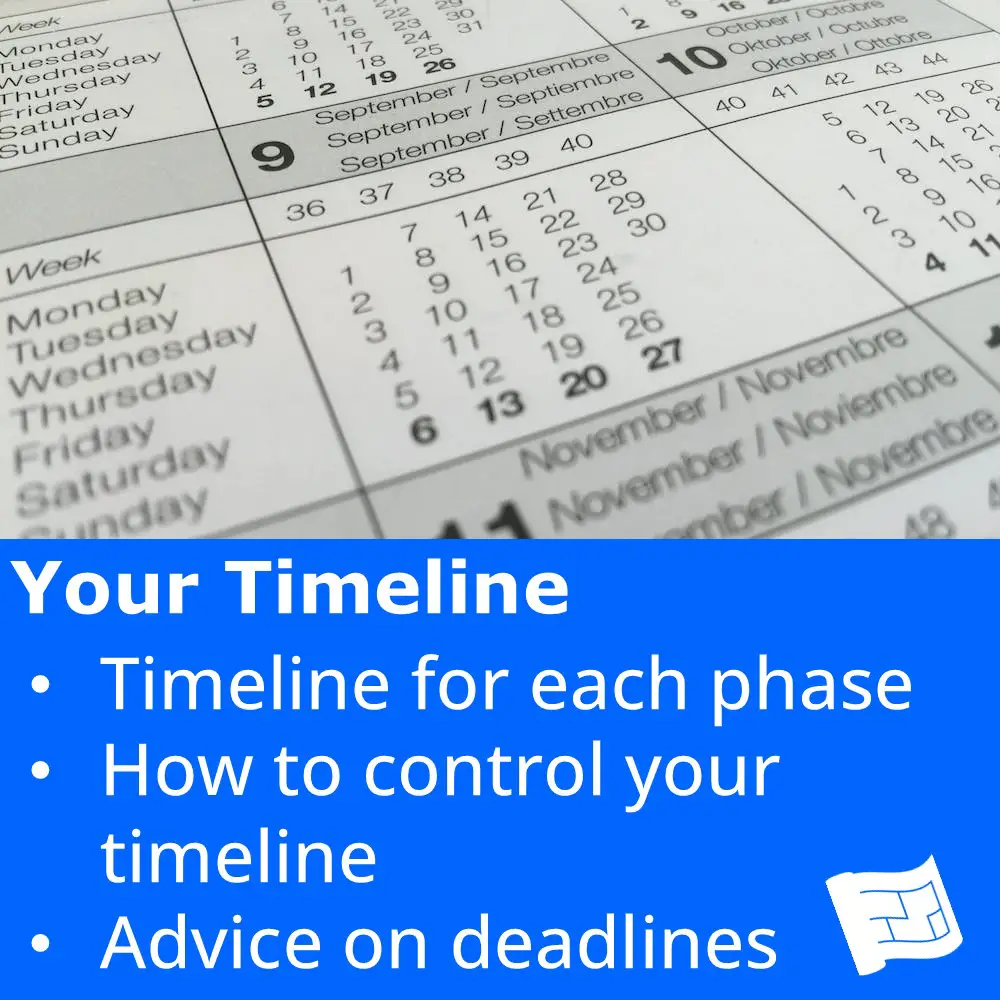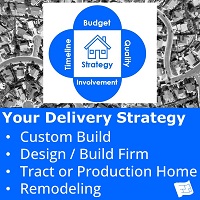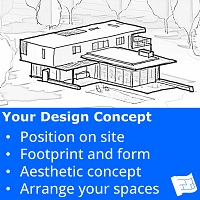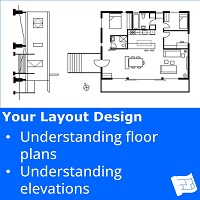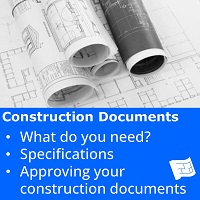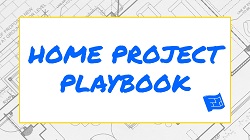- Home
- Project Playbook
- Your Timeline
Your Home Project Timeline
How long will my home build or renovation project take? That's a key question that you're looking for an answer to I'm sure.
Don't worry - I won't leave you with the 'how long is a piece of string' response.
The focus of this page is to give you an idea of how the timeline of your project will be split over the various project phases.
I also want to give you some advice about where to focus your time, where you'll be in most control of the amount of time any particular project phase takes, and the decisions you can make that will speed up or slow down the whole process.
Just as the project playbook is split into sections, it's important to think of your project timeline as split into the same sections.
Overall Timeline
It's not uncommon for homeowners to take several years over their home project when you include all the phases, from starting to think about it, to finding a site or a home to remodel and then going through the design and construction phases.
Before we examine each of the phases in more detail a word on deadlines....

Deadline driven
Setting your home project timeline is a question of balancing a realistic time frame with how long you're prepared to wait.
Most homeowners have a 'deadline' when they'd like their project finished by. Your deadline might be that you're having a baby, or you want to move in by Christmas or an anniversary, or you have a finite budget and therefore a time limit for renting somewhere else to live.
However it's important to examine the role of your project deadline. While a deadline creates motivation and momentum towards the finish line, it's important to balance this with the fact that you'll be living in your new home, hopefully for many years to come. So a short term deadline needs to be considered along side the long term goal of your dream home. It's important that the overall success of your project isn't compromised in the service of a deadline.
For example, let's say you want to move in before you have your baby. That's a very understandable reason to set a deadline. However, let's say the design/build firm that would be perfect for your project are only free on a timeline which would see your project completed a few months later than the date your baby is due to arrive.
Yes, it would be more convenient to move in before you have your baby (or it would be nice to have Christmas in your new home) but is that more important than taking your time to get your design right, or waiting to be able to work with the right builder in order to be sure you'll get a great outcome for your new home?
And I have a few thoughts on using Christmas as a deadline. Just think for a minute about the run up to Christmas. There's sooo much to get ready, do you really want to throw finalising your construction phase and then moving in on top of that?
And a few words on the role you play on keeping to your timelines

Don't be the bottle neck
In a project where not enough preparation has taken place, the homeowners can often become a significant source of delays. This usually occurs because the design or construction process is held up waiting for the homeowners to make a decision.
Don't be those homeowners.
Needless to say that if you've done your research and thinking ahead of each phase you'll be more effective at making timely decisions in line with the goals of your home project.
In particular, if your design phase is thorough, the vast majority of the decisions will be made before construction. In addition, the thinking that goes into those decisions places you in a good position to make timely decisions with good judgement if any unknowns crop up.
The other thing that can happen is that if you, as the homeowner, are slow to make decisions, it gives the other professionals on your project an opportunity (often rightly so) to pin any delays they experience on your slow decision making. They might also become slow at decision making and less responsive overall.
You might also find that they stop asking questions and start making decisions on your behalf.
Timeline for project preparation
Project preparation is a self-paced research phase. This is good news because you have a high degree of control over the length of time it takes.
Some of you may be simply imagining what your one day forever home will be like in which case you can languish luxuriously in this phase.
Others of you will be starting your project for real. It's 'go' time. And when it's go time, the temptation to rush is huge.
There's no problem with getting things done quickly in a timely manner, but your project is at risk if you hurl yourself straight into the design and build of your project and skip the preparation steps.
Set your project up for success by getting organized, considering your goals, your role on your project, your team and your budget.
Remember the 6 Ps.....
Prior Planning and Preparation Prevents Poor Performance
Sticking to your timeline during project preparation
The information you need for this phase is available in Phase 1 of the Home Project Playbook so there shouldn't be any significant hold-ups due to the unavailability of information.
The main influence on the length of time this phase takes is the time you have available and how you manage it.

Managing your time in preparation phases
What I've seen work well is when homeowners treat their project preparation like a weekly activity.
Most people find they naturally seek out information in their spare time. Research takes over TV time or social media time.
This coupled with a weekly 'meeting' for want of a better word to catch up and talk about progress and ideas keeps things going and means that you each communicate your ideas and hold all involved accountable for what needs to be researched.
Timeline for design preparation
Much of what I've said about project preparation can also be said about design preparation.
There are a couple of activities in this phase that start to be further from your immediate control:
- Finding a site - if you're already found your site or home to remodel then happy days. For some of you, the search will be long.
- Finding a design professional - sometimes it can take a while to find the design professional that's right for you and your project.
Outside of these two activities for design preparation, you're more in control of learning about your site, doing your design research, writing your design brief and thinking about your project delivery strategy.
More than ever, time spent preparing for design, will allow your design phase to progress as swiftly and smoothly as possible, all in service of the goals of your project.
Sticking to your timeline during design preparation
The spare time and weekly meeting method mentioned above for project preparation also works well during design preparation.
If you're looking for a site it can also help to have calls scheduled with a real estate broker to get updates on any land that might be coming available.
Timeline for Design
If you have a well-written design brief and have found a design professional (if applicable) to design your home, then there's every reason, with the input of your design professional, to set a timeline on the design phase.
Your timeline should include milestones for each of the design phases:
- Your Design Concept
- Your Design Layout (Floor Plans & Elevations)
- Design Development (Detailed Design)
- Construction Documents

Take your time
During schematic design, when the layout of your rooms and exterior features of your home is being decided, it's important to include time to go through several iterations to arrive at the design that you're happy to move forward with.
Discuss the number of design iterations that your project might require with your design professional and plan accordingly.
Essentially, as your project progresses through design and construction, any change you want to make has more impact and is more expensive, so take your time early on in the design phase to settle on the design that's right for you.
Sticking to your timeline during design
Establishing a timeline for your design phase will go a long way to keeping it on track. Remember to respect the timeline and make sure you're not the source of any delays.
Timeline for Construction
The construction phase is when all the planning from the previous phases is put into action and made real.
Your construction timeline is influenced by various factors, some that you will know about before you head into your construction phase, some that are within your control and others less so.
Let's take a look at those factors and what you can do to stick to your timeline during construction.
Size and complexity
Obviously a large and complex home is going to take more time than a small and simple home to build. You will know the size and complexity of your home before you start building so it can be factored into the timeline.
You can mitigate the length of time it takes to build a large complicated home by hiring a construction firm that has a large team and experience building homes similar to your design.
Permitting process
If you've been good you'll be well prepared for the permitting process and have all the documentation you need. However, things can happen during the permitting process that are beyond your control and can cause a delay.
Site preparation
Your site should be well known to you by the time you go into construction and so any issues will already be accounted for in the timeline, but there may still be some issues that crop up with the site or structure of your existing home during construction that cause a delay.
Be aware that careful demolition for a renovation can take longer than knocking down a whole home.
Labor availability
In times of labor shortages, the set up of your contractor will have the biggest impact.
A contractor that employs carpenters, electricians, plumbers and decorators will have control over how and when they are used.
A contractor with good relationships with sub-contractors may be able to persuade them to work on your project rather than another project.
Putting your project on the horizon of builders ahead of time, before you come to them for tender can help them plan labor for your project.
Material availability
The way construction projects are usually run, materials are bought on a just in time basis. Part of your home is built, you pay a bill then the contractor goes ahead and buys the materials required for the next step of your project.
If you foresee a material shortage it may be worthwhile discussing acquiring and stockpiling the necessary materials and the associated costs to do this.
Weather conditions
Last but not least - the weather. Beyond anyone's control.
Ask your contractor ahead of time what their strategy is for bad weather. Some contractors can erect very effective tents to keep things moving and everyone on site more comfortable.

When deadlines become counter-productive
As discussed above, deadlines are important for the project plan, but sometimes it can get to the point where the pressure that the deadline puts on both you and your team, and the resulting stress and anxiety is counter-productive to all involved and therefore to your project.
This is not to say that plans should be thrown out the window. Your contractor should have a detailed plan which will show very quickly when things get off track. What should follow is an open conversation about why your project is behind, what can be done to bring the project back on track, and if this is not possible, how all parties will deal with the impact of the extended timeline.
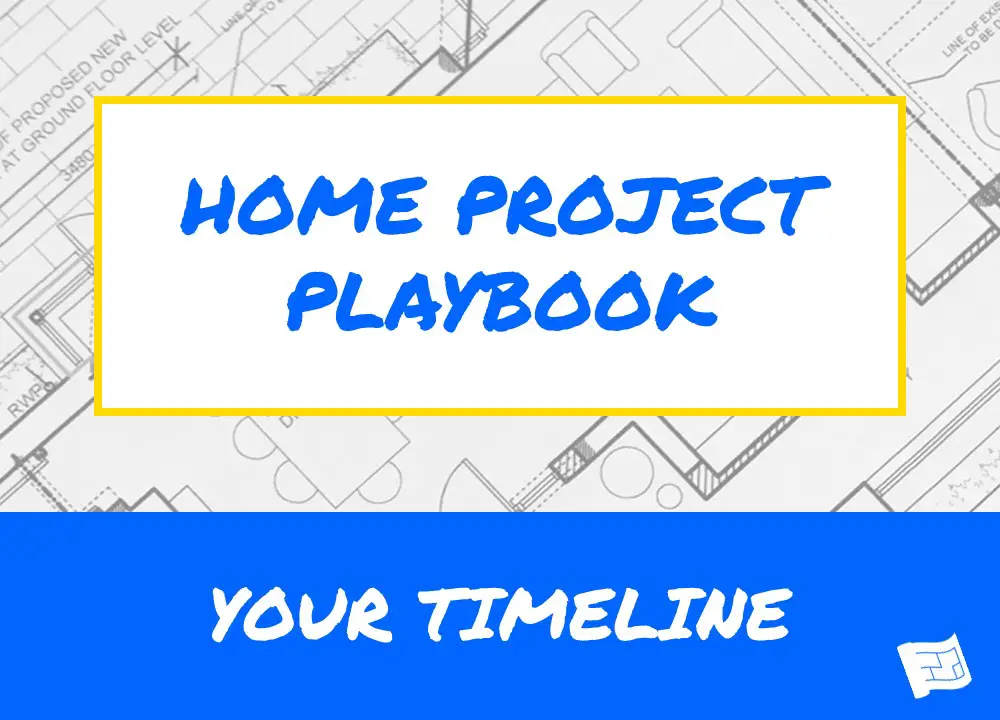
The Playbook is a work in progress. Anything without a link is coming soon.
Phase 1 - Project Preparation
Phase 2 - Design Preparation
Phase 3 - Design
Phase 4 - Construction
Your Contractor / Builder
Your Contract
Building Your Home

